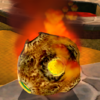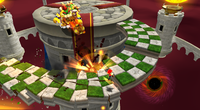Meteor: Difference between revisions
No edit summary |
|||
| Line 14: | Line 14: | ||
====''Super Mario Galaxy 2''==== | ====''Super Mario Galaxy 2''==== | ||
In ''[[Super Mario Galaxy 2]]'', meteors prominently appear in the [[Shiverburn Galaxy]], where they create temporary pools of [[lava]] when they collide with ice. [[Ice crystal|Similar objects]] that create ice platforms when they fall in lava also appear in the Shiverburn Galaxy. | In ''[[Super Mario Galaxy 2]]'', meteors prominently appear in the [[Shiverburn Galaxy]], where they create temporary pools of [[lava]] when they collide with ice. [[Ice crystal|Similar objects]] that create ice platforms when they fall in lava also appear in the Shiverburn Galaxy. | ||
{{br|left}} | {{br|left}} | ||
Revision as of 05:05, April 13, 2022
- This article is about meteors that fall to the ground and act as obstacles. For the larger space rocks that can be ground-pounded in Super Mario Galaxy 2, see Meteorite. For attacks in the Super Smash Bros. series that send opponents downwards, see Meteor smash.

Meteors are small spherical rocky projectiles that have entered the atmosphere and are burning up due to the resulting friction.
History
Donkey Kong Jungle Beat
In Donkey Kong Jungle Beat, meteors first appear at the end of Sweet Paradise, where they fall diagonally from the top of the screen before exploding.
Super Mario series
Super Mario Galaxy
Meteors are featured prominently in Super Mario Galaxy, where they periodically crash into some planets in various galaxies. If hit by one, Mario (or Luigi) will take damage. They first appear being shot from cannons by airships in the opening, and appear as obstacles shortly after in the Gateway Galaxy. When Mario traverses the large staircase at the end of Bowser's Star Reactor, Bowser launches meteors from his mouth to destroy the platforms Mario walks on. In Bowser Jr.'s Lava Reactor, they fall from the sky during the final part of the battle with King Kaliente. Meteors prominently appear in the Melty Molten Galaxy in the mission Through the Meteor Storm, where they rain down during the entire mission. The meteors will not spawn if the player is looking directly at their spawn point.
Super Mario Galaxy 2
In Super Mario Galaxy 2, meteors prominently appear in the Shiverburn Galaxy, where they create temporary pools of lava when they collide with ice. Similar objects that create ice platforms when they fall in lava also appear in the Shiverburn Galaxy.
New Super Mario Bros. U
| It has been suggested that this section be split into the following: Meteor, Bowser's flame. (discuss) |
Similar objects known as Bowser's Flames[1] appear in New Super Mario Bros. U; they replace the volcanic debris of previous titles and have the same function, but they shower down more constantly rather than at designated intervals. They appear in the Peach's Castle levels Meteor Moat and Firefall Cliffs. In the former level, they tend to trail behind the player and catch up if they remain in the same spot for too long, and in the latter level, their movement is fixed due to the auto-scrolling element. In New Super Luigi U, they appear in the replacement levels Magma Moat and Firefall Rising. In addition, Bowser's fireballs take on the same appearance and can also rain directly downwards. Bowser also shoots down flames in Super Mario Maker and its remake in the New Super Mario Bros. U theme in similar patterns when he is riding a Lakitu's Cloud.
Mario Party: Island Tour
In Mario Party: Island Tour, meteors are found in the minigame Meteor Melee, in which they fall from the sky and deduct points upon collision.
Names in other languages
Meteor
| Language | Name | Meaning |
|---|---|---|
| Japanese | メテオストライク[2] Meteo Sutoraiku |
Meteor Strike |
Bowser's Flame
| Language | Name | Meaning |
|---|---|---|
| Japanese | 火炎弾[3] Kaendan |
Fireball |
| Korean | 불덩이 Buldeongi |
Fireball |
References
- ^ Stratton, Steve. New Super Mario Bros. U PRIMA Official Game Guide, pages 14, 190 and 196.
- ^ Shogakukan. 2015. Super Mario Bros. Hyakka: Nintendo Kōshiki Guidebook, pages 137 and 171.
- ^ Shogakukan. 2015. Super Mario Bros. Hyakka: Nintendo Kōshiki Guidebook, New Super Mario Bros. U section, page 215.
